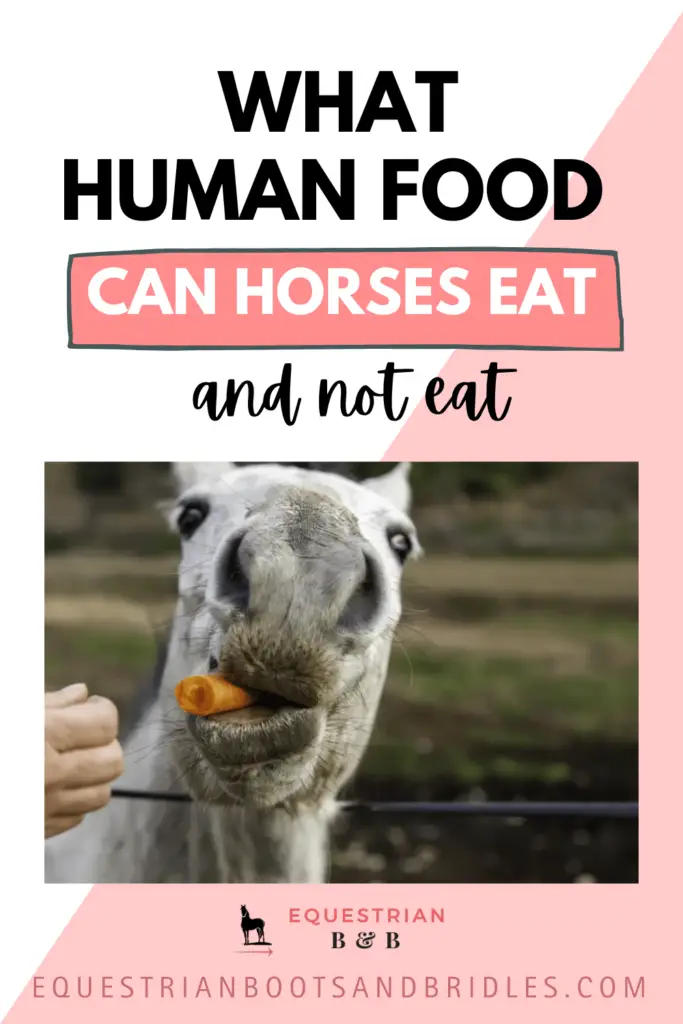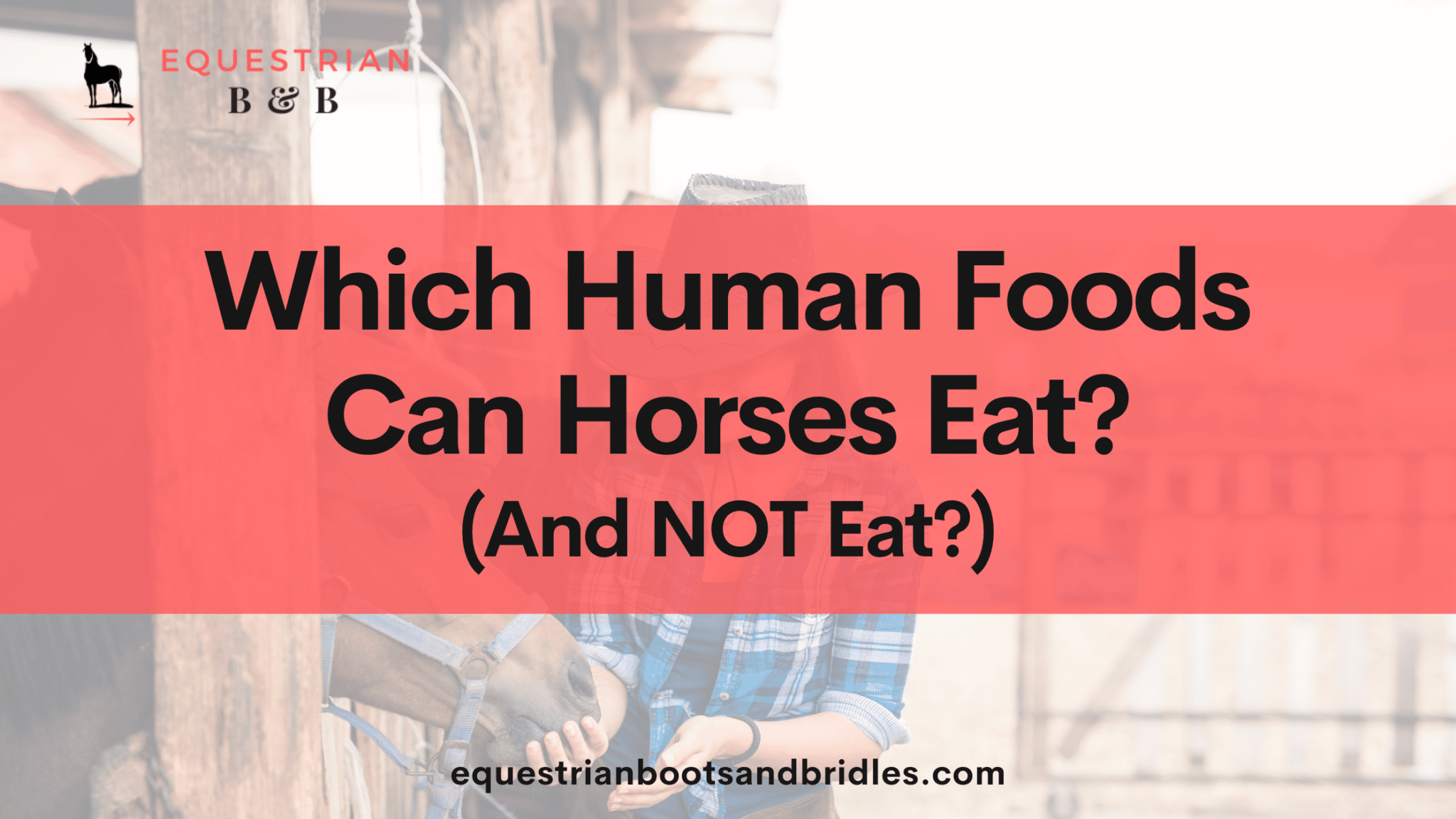Recently, I visited a friend on the other side of the country, and we were hanging out at her barn when she casually threw an egg into her horse’s feed bowl.
Surprisingly, her horse ate the egg (shell included) and loved it! I had never even considered feeding my horses anything but the usual human treats like carrots and apples, so this got me to thinking: Just what human foods can horses eat?
Disclaimer: Like people, not all horses are the same, and some horses are more sensitive to a particular food type than others. Take care when feeding anything new to your horse, and monitor them for signs of adverse reaction. Horse owners should always use their own judgment when selecting food for their horses.
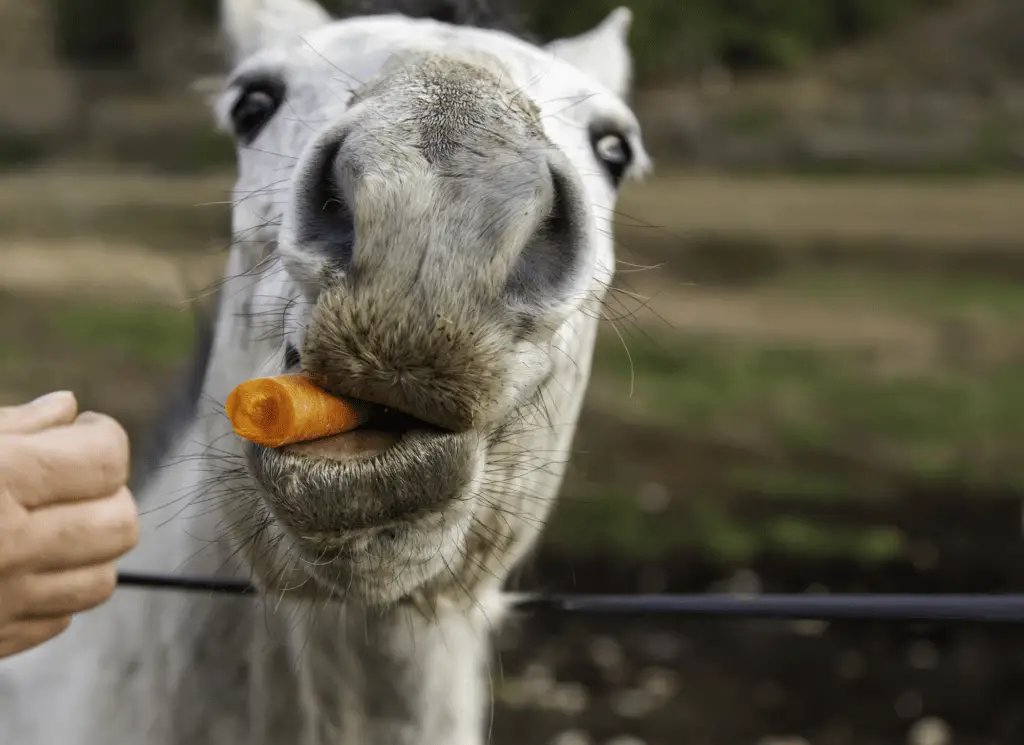
37+ Human Foods Horses Can Eat
Various human foods are suitable for horses. That said, it’s always best to feed natural food to avoid chemicals, colorants, and preservatives that may negatively affect your horse’s digestion. Some foods are safe only when cooked, while others can be fed raw.
When deciding on what foods can horses eat as a treat, bear in mind that it’s a treat, and it shouldn’t be fed in large quantities. Some fruits, vegetables, and grains are high in sugar, which can cause serious ill-health for horses.
Vegetables Your Horse Can Eat
Horses are meant to eat grasses and live off a diet of roughage and natural proteins found in grass seeds. However, horses will eat vegetables like roots, carrots, and leafy greens when available in the wild.
Here are a few common vegetables and leafy greens to include in your horse’s diet as treats.
- Carrots and Roots
Carrots are edible and can be fed to horses as treats and as part of their nutritional diet supplementation. However, carrots are also rich in sugar, making them risky for an insulin-resistant horse.
Carrots are 86% moisture (great for oldies who don’t want to drink), 0.9% protein, and 10.6% carbohydrates (aka sugar). Mostly, it’s a great veggie to feed your horse.
Recommendation: No more than a carrot every other day, as the sweetness can prove harmful to horses’ laminae and cause laminitis if your horse is sugar sensitive.
- Celery
Feeding your horse celery is a great idea as it’s mostly fiber and water, and it’s also an excellent source of essential fatty acids like petroselinic, oleic, and linoleic acids to help boost gut and joint health. Horses eat celery to help fight off inflammation.
Recommendation: Feed half a celery stick daily or a handful of celery leaves. Psst: It’s not really an ingredient your horse will willingly overdose on.
- Lettuce
Lettuce is sweet tasting, so most horses eat lettuce with relish. It’s also low-carb for horses with insulin resistance or a tendency toward obesity and laminitis. Nutritionally, lettuce is rich in B vitamins and immune-boosting components like carotenoids and natural iron.
Recommendation: Feed a couple of leaves when you happen to be near your horse.
- Butternut Squash and Pumpkin
Squash is a rich source of fiber, zinc, and other easy-to-digest polysaccharides. There’s a reason pumpkin is one of the first solid foods that babies eat—it’s good on the tummy. Wild horses eat pumpkin when they can find it.
Recommendation: Feed a few slices of raw squash every other day or add a large spoon of cooked (and cooled) squash pulp to your horse’s evening ration.
- Sweet Potatoes
Sweet potatoes are great for babies—and horses too! Feed it raw or cooked. Sweet potatoes are rich in potassium and vitamin C.
Recommendation: Don’t overdo it, as sweet potatoes are rich in carbs, making it less suitable to horses with weight gain. Feed a few cubes of fresh sweet potato once a week or a few spoons of cooked sweet potato in their evening feed.
- Turnips
Surprisingly, turnips are safe for horses to eat, despite it being part of the brassica family (most of which is NOT safe for horses to eat).
Turnip greens are an excellent source of vitamin K, sodium, zinc, and vitamin C. Additionally, turnips are a great source of fiber for horses that tend toward colic.
Recommendation: There’s no limit on the serving for turnip greens, but the turnip root should be limited to two thumb-sized pieces per serving. Alternate with other safe treats to avoid your horse getting bored with it.
- Green Beans
Green beans are an excellent source of fiber and protein, and they’re also low in fat. The sugar content is reasonable, making it a safe treat for your horse.
Recommendation: Treat your horse to two to three beans (leaves are fine too) every so often.
- Peas
Peas are sweet tasting and are rich sources of magnesium, potassium, and calcium, as well as vitamin C and phytonutrients that fight off disease.
Recommendation: Due to the sugar content, it’s advisable not to feed more than a small handful of peas (fresh only) to horses as an occasional treat.
- Beets
Yep, horses love beets, and beets love horses. Beets are so good that beet pulp is dried and sold as a high fiber pellet (or flake) for horses that tend toward dehydration and colic. The high fiber content soaks up water and helps things move along in the gut.
Beets are also rich in vitamin B and minerals like calcium, magnesium, iron, and potassium.
Recommendation: Feed dried pulp (with water) or a small to medium-sized beetroot (cubed) every other day. When feeding raw beetroot, your horse’s stool may darken somewhat, but don’t overdo the beet as elevated iron levels aren’t great for them either. There’s no limit to feeding beet greens.
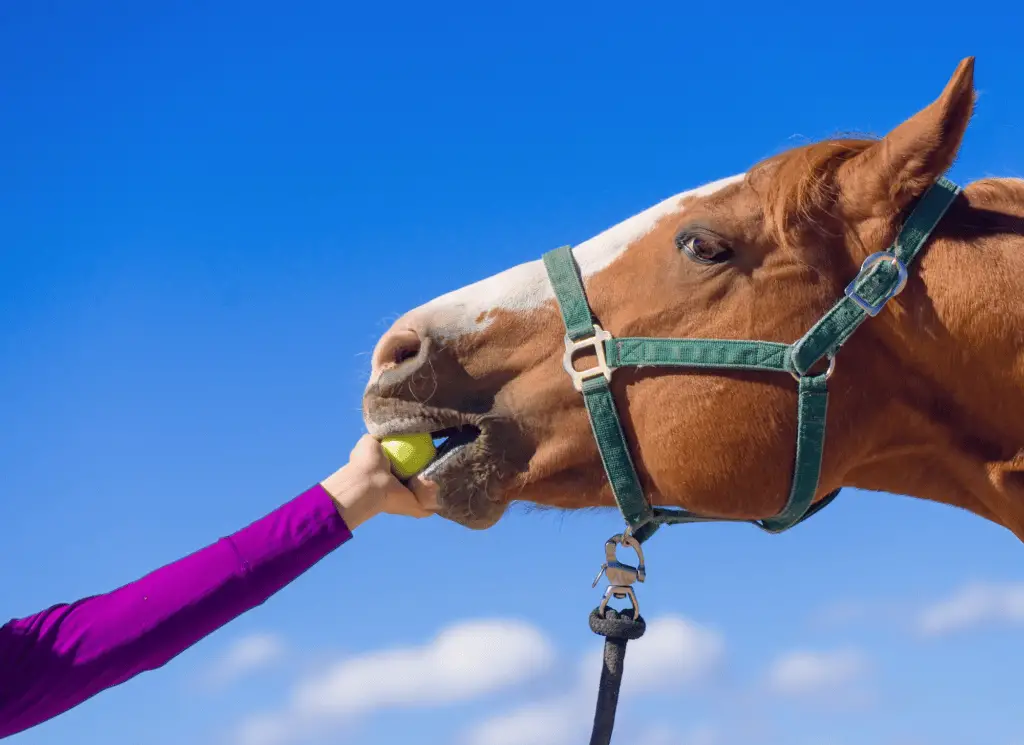
Fruits Your Horse Can Eat
Horses love the sweet taste of fruits, and you’ll be amazed by how quickly they can gobble up sliced fruits or even scoff a whole apple or pear.
Here are some common favorite horse-friendly fruits to feed:
- Apples
Apples are a traditional treat choice that most horses can safety eat (and most horses love them). They do contain a large percentage of natural sugar (10.4 grams per 100 grams). Apples are also rich in fiber and water.
Recommendation: One small apple (cubed or grated) every other day.
- Pears
Pears are similar in nutritional value to apples, but they are also sweeter (more than 17 grams sugar per pear) and can be used as pulp to entice a horse to eat meds when needed. Pears are rich in potassium and vitamins C and K.
Recommendation: Feed half a small to medium pear as an occasional treat.
- Bananas
Surprisingly, horses eat bananas—even the peel! Bananas are a rich source of protein and carbohydrates and loads of potassium (450 milligrams per banana), which is excellent for horses in hard work. Bananas are also said to help a horse’s digestive tract when they have a slightly runny tummy.
Recommendation: Feed a small banana as an occasional treat. Some horses like it with the peel while others eat it without.
- Watermelon
Watermelon is a rich source of water, sugar, vitamin C, and fiber. It’s a great treat to feed horses in warm climates.
Recommendation: Serve a slice or two every once in a while. If you serve the rind too, ensure you cut the slice to avoid a choking hazard.
- Apricots (without stone)
Apricots are rich in fiber and sugar, making it a very occasional treat to feed your horse. It’s also rich in flavonoids that help prevent inflammation, making them an ideal treat when your horse competes.
Recommendation: Remove the stone before feeding or feed dried apricots (without extra sugar). A few apricots every once in a while is good.
- Strawberries and Cherries
Strawberries are high in antioxidants, and these little flower-berries are great treats for horses. High in vitamin C, strawberries are also excellent sources of folate, iron, and phosphorus.
Cherries are also dense in nutrients, but perhaps the most important reason horses thrive on cherries is that they are loaded with choline, which aids the regulation and repair of the central nervous system.
Recommendation: Feed fresh strawberries or cherries. Jellies and preserves are loaded with extra sugar, so opt for fresh and organic fruit instead. Feed a few berries at a time, once or twice a week. Ensure you remove the cherry pits.
- Grapes and Raisins
Horses eat grapes and raisins, which are rich in vitamin K, thiamine, and riboflavin (vitamin B2).
There’s still some debate about whether the seeds are safe for horses, so err on the safe side and remove the seeds.
Recommendation: Feed a small bunch of grapes every other day when in season. Likewise, seedless raisins can be fed in a small handful at a time (especially in winter).
- Pineapples
Horses love eating pineapples. This fruit is high in fiber, water, and many vitamins like vitamin C and different vitamin Bs. A few slices will also load up your horse’s copper intake, helping out with skin issues and more.
Recommendation: Remove the skin and thorns, slice, and feed. If the core is slightly fibrous, it’s a better idea to remove the core too. Feed occasionally.
- Citrus Fruits (Oranges, Tangerines, and Grapefruit)
When my horse decided to push me aside to gobble up my orange, I was convinced I’d found her favorite treat. Horses eat oranges, tangerines, and even grapefruit with great joy. Citrus fruit is high in fiber, vitamin C, calcium, and folic acid.
Recommendation: Horses can eat quite a bit of citrus fruit, but remove the peel or skins and the seeds to help a tender digestive tract. However, don’t panic if your horse grabs an orange peel from you and munches away.
- Mangoes
Mangoes are another fruit that can help your horses increase their copper and manganese intake. The fruit is also loaded with vitamins A, B, and C.
Recommendation: Remove the skin and offer your horse a couple of slices as an occasional treat.
- Peaches (without stone)
Give your horses a vitamin boost with peaches as a treat. Peaches are dense in vitamin C, A, and K. Peaches can also help soothe mild colic due to the pulpy texture and extra fluid boost to hydrate a sensitive gut.
Recommendation: Remove the stone, then slice and feed your horse this treat once or twice a week.
- Dates
Due to the natural sugary taste, horses love dates. They’re packed with great mineral value and are dense in potassium and magnesium, which aids normal nerve function.
Recommendation: Opt for a few seedless dates that are either fresh or preserved. Fresh is better as it contains fewer additional ingredients like sugar.
- Coconut
For a horse that tends to be slightly anemic, feeding raw coconut flesh is a great idea, as it’s packed with iron, manganese, and copper to improve cellular function.
Recommendation: Fresh, raw coconut is best, and you can give your horse a piece as large as the palm of your hand at a time. However, don’t feed the husks, which are indigestible to horses.
- Cucumber
Older horses thrive on cucumbers as a treat since it introduces more water into their diet. It’s sweet, without being sugary, and it’s high in potassium and other minerals.
Recommendation: To feed the cucumber, simply slice it into long slivers and feed whenever you can, as this is a horse-friendly treat that can be fed frequently. Don’t exceed more than an inch of sliced cucumber (sliced) at a time.
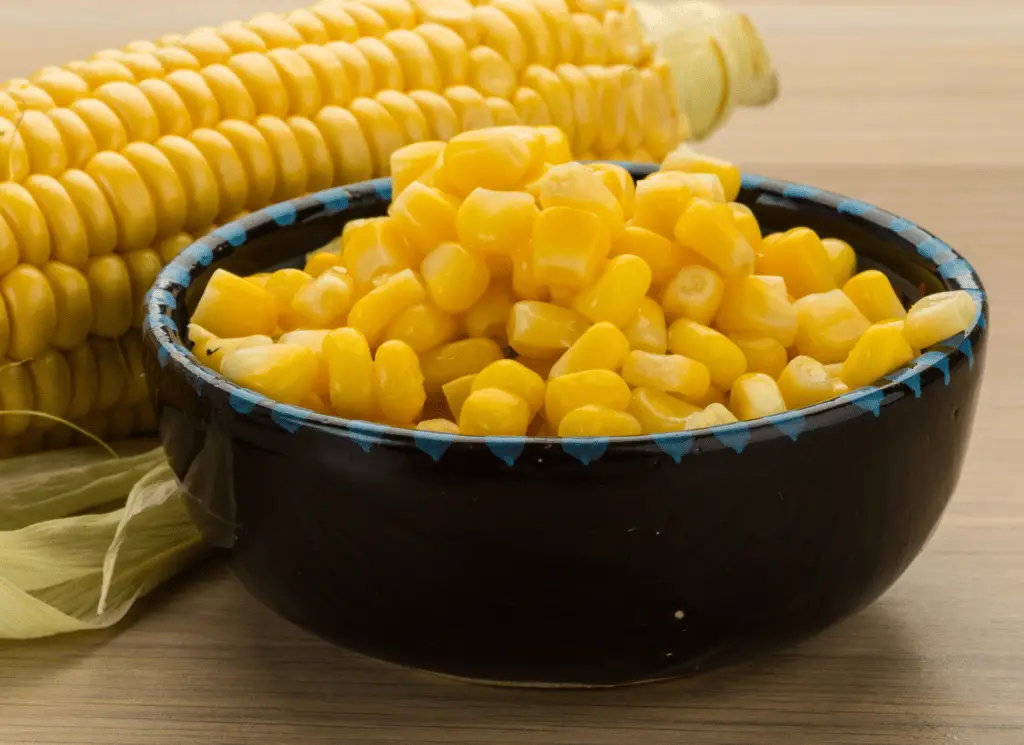
Cereals and Grains Your Horse Can Eat
Horses can eat most types of grain and cereal, but the toxins that these can develop when incorrectly stored or if produced with the aid of pesticides and excessive fertilizer can be a problem.
Depending on the treat, your horse may also not be able to digest all types of grain when fed in whole unshelled form.
- Oats
Feed oats as a treat and supplement for horses that tend to lose weight in winter or struggle with a sensitive gut. Oats are loaded in minerals like phosphorus, manganese, copper, and biotin.
Recommendation: Serve oats raw or cooked, soaked, or dry. Soaking raw oats (unshelled) in cold water for 24 hours is also a great way to feed without your horse getting fizzy. Start with a small handful, and if needed, increase to a double handful for horses that are hard doers. Feed once a day when needed.
- Barley
While you are making a pot of barley soup for winter, you can also feed your horse a handful of cooked barley to increase their fiber, minerals, and B vitamin intake. Cooked barley is ideal for older horses that need an extra boost.
Recommendation: Soaked barley is best for horses that are sensitive to dry treats, and rolled barley also makes a great treat. Feed a handful or two at a time per meal. Cooked barley is safer than dry barley, though it’s best to cook it until creamy before feeding.
- Corn
Also called maize, corn is a favorite ingredient in horse feed. However, due to the high sugar content, it’s known to cause horses to become fizzy. Corn is rich in essential minerals like magnesium and potassium and vitamin C. It’s also a dense fiber source.
Recommendation: Corn can be fed cooked off the cob or fresh. Horses enjoy eating dried corn kernels, but take care to do this in small quantities as it can lead to hindgut issues. Horses also love eating the corn leaves (dried or fresh). Feed a handful of corn kernels or a small cob once in a while.
Avoid crushed corn (such as chicken feed) as it can create sharpened particles that can be inhaled and perforate the gut when the horse doesn’t drink enough water.
Safety Note: Take care to only feed corn that is free of mold or discoloration that could indicate the presence of mold and bacteria, which can lead to serious issues with gut health.
- Wheat
Horses enjoy a helping of wheat, but take care not to overdo this tasty grain as it can be rough on their digestive systems (requiring a lot of enzyme activity to digest).
Fresh wheatgrass is a healthy alternative that horses take easily to. Wheat offers several health benefits, including being rich in phosphorus, magnesium, potassium, calcium, and folate.
Recommendation: Soak wheat for several hours in warm water to soften the outer husk, making it more digestible. Feed a handful as a treat, though, do so infrequently while checking for signs of allergies as some horses are wheat intolerant.
- Rice
Horses can eat rice. Traditional horse feeds include rice bran, rice oil, and even rice flour. Rice should be heat treated for better digestion. It’s worth it though, as rice is a great source of protein, fiber, vitamins, and minerals.
Recommendation: Soak regular parboiled white or brown rice in water and allow it to expand during the morning for the horses’ evening feed.
Note: never add any spices or salt, as you want rice only. For older or young horses, mash the soaked and cooked rice. Feed about a cup of the rice mash with their feed as a supplement or less, as a treat. Rice can be fed daily.
- Sugarcane (Sugar cubes)
A popular treat is to feed sugar cubes or sugarcane to horses. Surprisingly, it’s one of the more natural horse treats (especially sugar cane), as cane is part of the grain and grass food groups.
Sugar in itself has little nutritional value, other than as an energy source with loads of carbohydrates. Sugarcane has the additional benefit of offering roughage or fiber as well as some vitamins, minerals, and antioxidants.
One consideration is that refined sugar isn’t great for your horse’s teeth, as they can develop cavities and suffer tooth decay.
Recommendation: Treat your horse to a thumb length section of sugarcane or hang a few sugarcane branches in their stable to chew on. Sugarcane should be an infrequent snack as it’s high in sugar, which can lead to obesity and gut sensitivity.
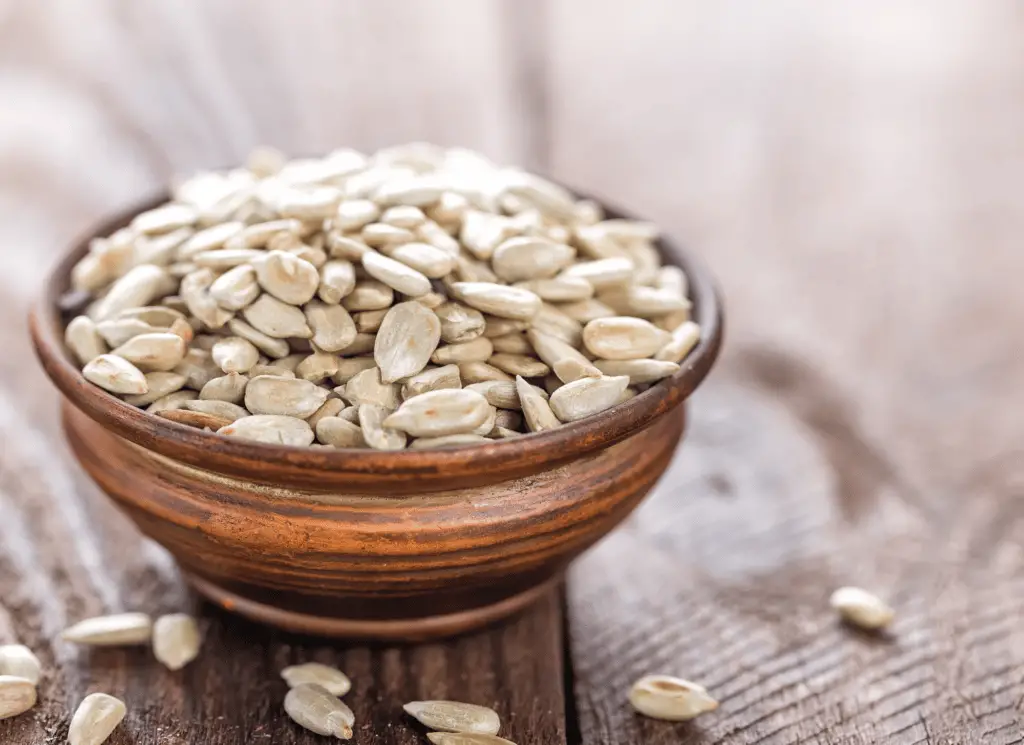
Nuts and Seeds Your Horse Can Eat
Horses can eat nuts and seeds, and some seeds are excellent mineral boosts for horses. However, some nuts and seeds are also highly toxic to horses, so it’s vital to know which are safe for your horse to eat.
- Sunflower Seed
Sunflower seeds are high in zinc and selenium, which are vital for healthy skin and nerve function. Sunflower oil has been a traditional staple in many animal feeds, including horse feed, for years, and it’s a healthy fat for horses to ingest in small quantities.
Recommendation: Feed a handful of sunflower seeds once or twice a week for a mineral boost as a snack. For a nutritional supplement to help with weight gain, you can feed as much as a cup of seeds per day. The black and white “oil” sunflower seeds are safe to feed with shells.
- Millet Seed (Pearl Millet)
Millet is usually part of a healthy horse pasture grass. The seeds make a great treat for horses, and when ground to break the shell and cooked, millet offers a powerful nutritional boost. Millet is high in protein (6 grams per 175 grams), phosphorus, magnesium, and folate.
Recommendation: For a treat, cook a few tablespoons of crushed white millet in the microwave with loads of water for two to four minutes. Stir frequently as the millet porridge quickly boils over. Cool and feed. As a supplement for weight gain, cook half a cup to a full cup of crushed millet per day.
- Linseed, aka Flax Seed (with caution)
Linseed is always a bit of a questionable feed for horses. Horses love the taste, but linseed can become toxic and release cyanide in micro amounts. Whether this can actually poison a horse depends on the quantities fed.
Linseed or flaxseed is high in omega acids, which are great for joints and healthy skin. With a high protein content (18%), flax seed is also a preferred supplement for weight gain.
Recommendation: Most often, the hardened shell of linseed passes undigested through the horse’s gut. Crushing linseed enables faster digestion, but it should be fed immediately when crushed or cooked. Cook crushed linseed to make a frothy porridge that can be fed once cooled. For a treat, feed a large spoonful per day, and increase up to a cup per day for supplementary feeding.
- Peanuts (with caution)
Peanuts are surprisingly tasty to horses and loaded with phosphorus and minerals. However, it’s high in protein (over 25%), making it best to feed infrequently and in small quantities. Another possible issue with peanuts is that some fungal growths that form on poorly stored peanuts can cause liver damage in people and horses.
Recommendation: Limit peanuts to fresh organic peanuts and only a few nuts at a time every so often. Never feed peanut butter, as processed peanuts contain preservatives, sugar, salt, and even artificial sweetener, which can be bad for horses.
- Pecan Nuts
Pecans are a horse favorite, from the nut to the leaves and even the tree branches. However, expect weight gain if your horse eats a lot of these nuts as they are high in protein and fats. Eating unshelled nuts can also cause tooth fractures and dental and digestive problems.
Recommendation: Feed a few shelled pecans once in a while, or feed the leaves more frequently.
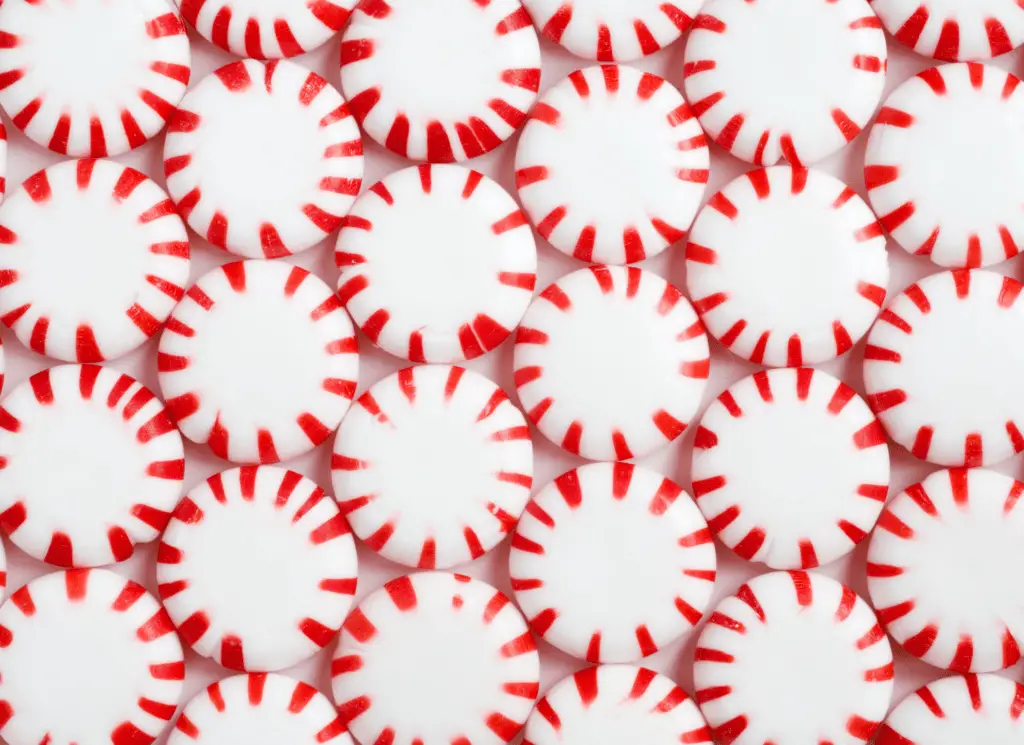
Commercial Sweets Your Horse Can Eat
- Peppermint Candies
You can feed peppermint candies, candy canes, and Lifesaver mints to horses as the basic ingredients are sugar, sugarcane, and food coloring. Horses that are sugar sensitive or suffer laminitis should avoid these treats. Peppermint candies have the same nutritional value as sugar (not much).
Recommendation: Feed a mint before a ride or a small section of candy cane on a special occasion.
- Popcorn
Traditional popcorn is corn kernels that have been cracked and expanded by heat (much better for horse digestive health). When it has no flavoring (no butter or other flavorings), it’s safe for horses to eat in small quantities.
Popcorn carries all the nutritional values of corn, with the added benefit of being more digestible since it’s been heat treated.
Recommendation: For safety, it’s recommended that you pop the corn yourself and serve it fresh. Avoid any flavorings and candied corn, and monitor your horse for signs of coughing or choking. Feed as an occasional treat under supervision. A handful once a week seems to be the sweet spot.
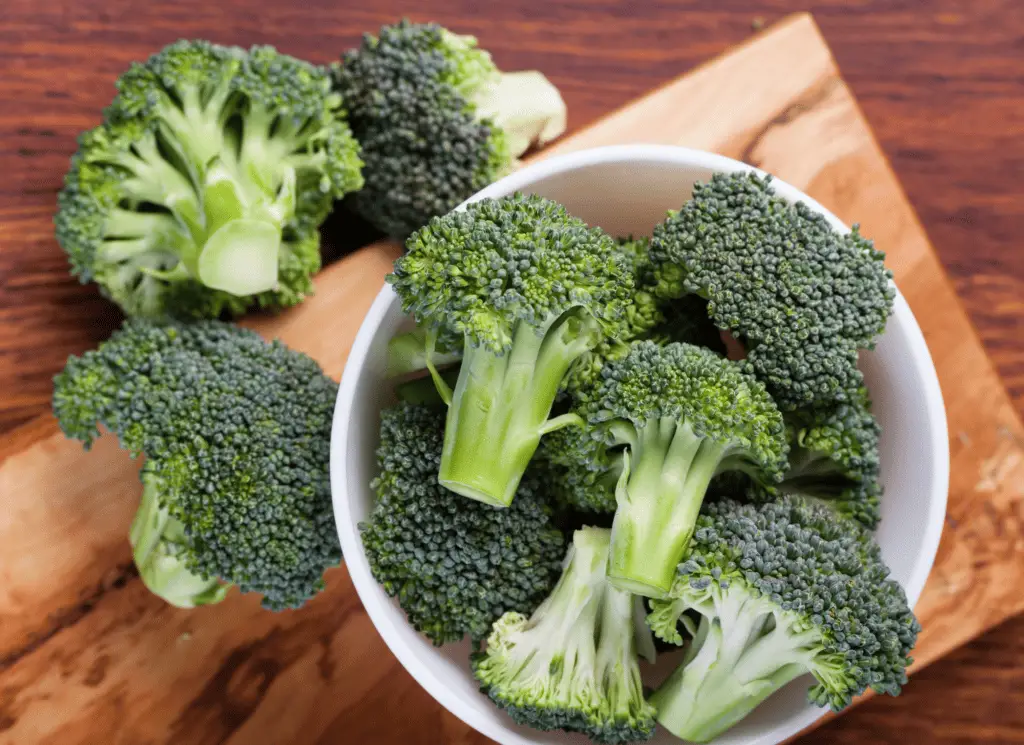
11+ Treats to AVOID Feeding Your Horse
Not all food or human food is suitable for horses to eat. A few are toxic and can cause digestive system failure, colic, and even death.
In a list of what foods can horses not eat, here are the real baddies to avoid feeding your horse:
- The Brassicas
Avoid feeding cabbage, broccoli, cauliflower, kale, and Brussels sprouts. This family of foods is known to cause gas-related colic.
- Nightshade Family
Members of the nightshade family such as potatoes, tomatoes, eggplant, peppers, and tobacco should be avoided. These plants produce toxic chemicals like solanine and Solanaceae alkaloids, which can cause nerve damage.
- Chocolate
Chocolate contains theobromine, which is toxic to horses.
- Avocado and Litchi Fruit
Avocado pit, skin, and the leaves of the plant are highly toxic to horses. Litchi fruit has been known to cause nerve damage to horses.
- Persimmons
The sticky seeds of persimmons can cause intestinal blockage and gas colic.
- Lawn Clippings
Mown grass can contain chemicals that are harmful to horses. The sudden sugar boost of lawn grass can also cause gas colic.
- Baked Goods
Human confectionery, breads, and treats often contain harmful chemicals that horses can’t digest. Even bread can be lethal to a horse’s digestive system.
- Dairy and Meat Products
Cheese, milk, yogurt, and meat are not suitable for horses to eat. Horses lack the enzymes to properly digest animal protein since they are herbivores. The result can be colic or toxicity.
- Soda and Other Sweets
Sodas aren’t great for horses as the extra sugar can cause laminitis. Some horses can even be allergic to the chemicals and colorants in other human sweets.
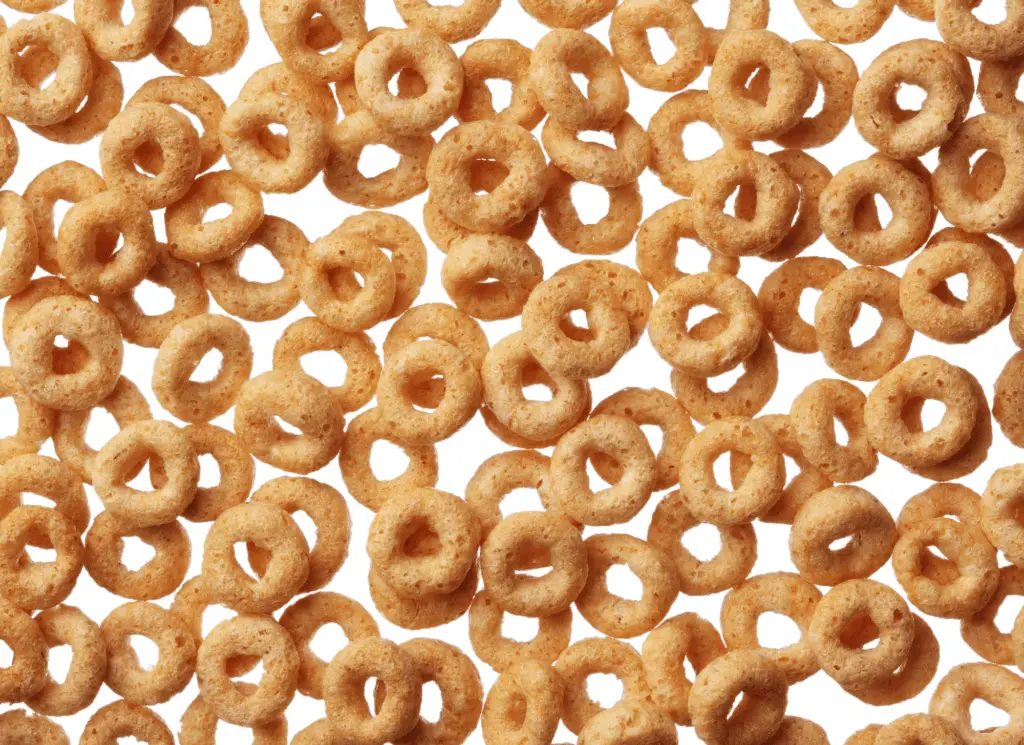
Human Food as Horse Treats FAQs
Can horses eat Cheerios or other breakfast cereals?
Horses can eat cereals, but the preservatives, colorants, and additives that some cereals like Cheerios contain could be toxic to a horse, especially if fed in large amounts or over a long period of time.
Can horses eat peanut butter?
Horses shouldn’t eat peanut butter due to the additives in peanut butter, which can potentially cause organ damage.
Can horses eat mushrooms?
Mushrooms are safe for horses to eat, provided they are not a deadly variety like death cap mushrooms.
Horses can eat most foods humans eat. However, that doesn’t mean they should eat everything you do. The quantities you feed treats can also influence whether a treat is healthy or not. If you are unsure of a particular treat, play it safe and avoid feeding it to your horse. While a food type may be safe, the microorganisms that live on that food may not be safe for your horse.
When in doubt, you can always ask your vet (especially if your horse has any specific health concerns.)
So feed wisely and limit quantities of treats to help manage your horse’s weight, diet, and health better. Stick to traditional options like carrots or sugar cubes if you are unsure. Read more about why horses love sugar cubes.
Like this post? Save it on Pinterest. Follow me on Pinterest.
